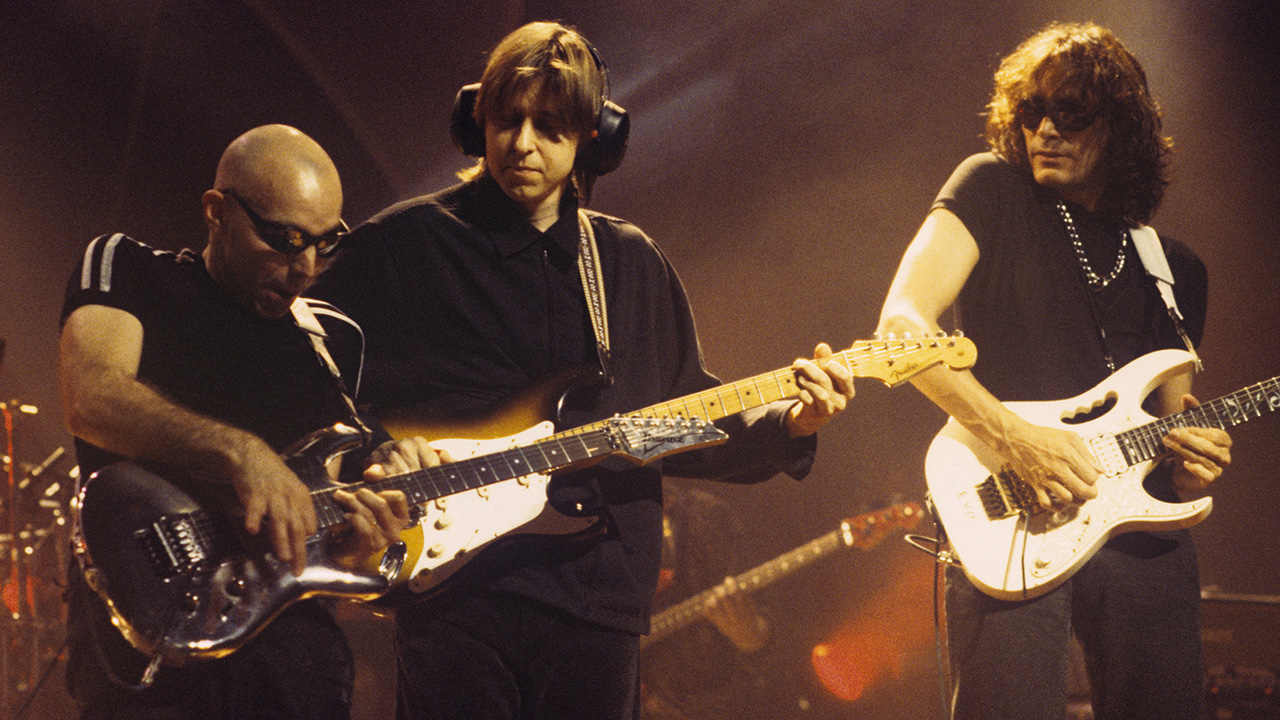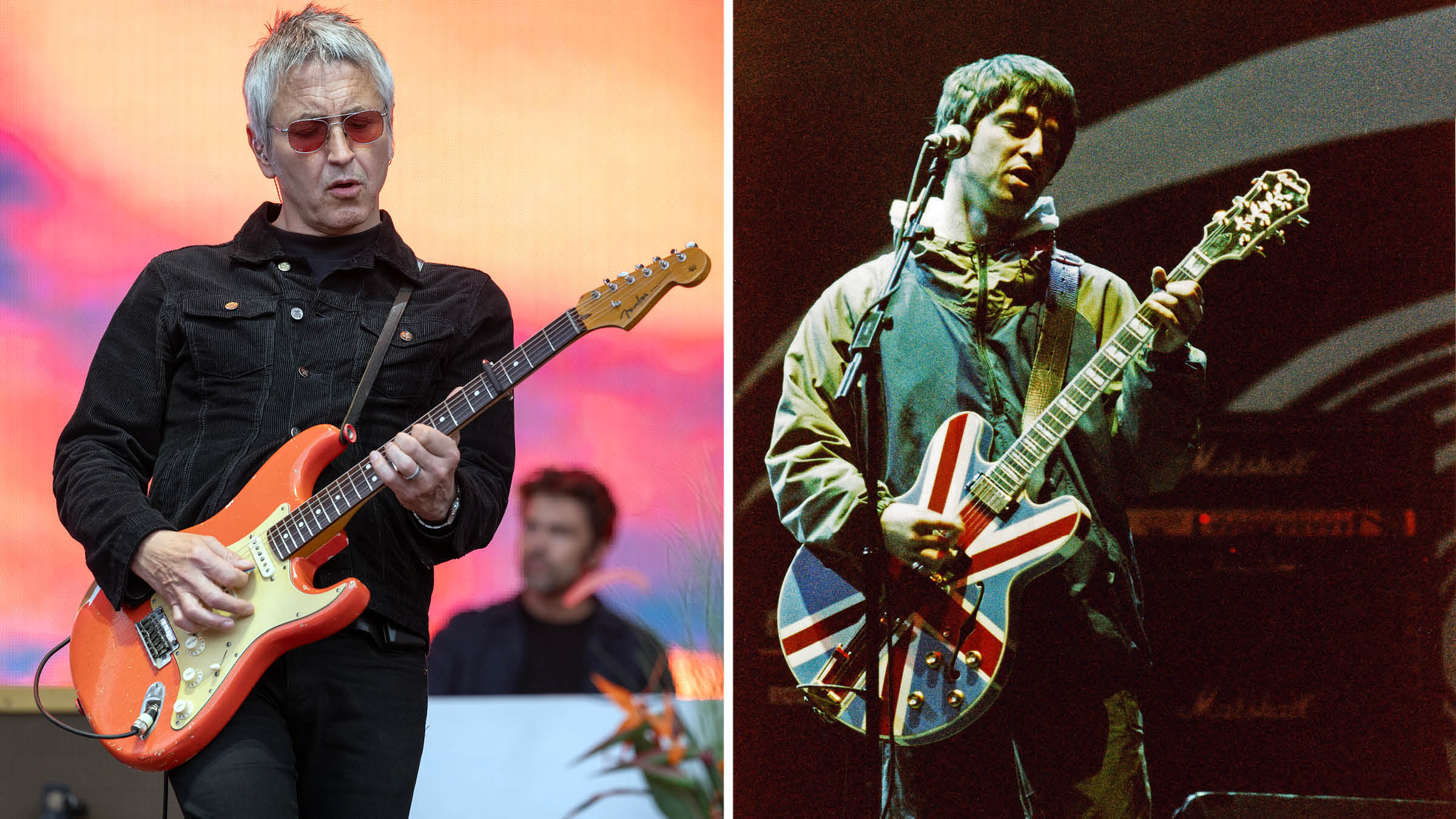“Steve Vai and Joe Satriani’s setups are amazing examples of streamlined innovation. But with my maple neck Strat, it would be hard to do what they’re doing”: Eric Johnson on G3, profilers, and the custom pedal he “might actually put on the market”
Reunited with old friends for a new run of shows, Johnson still swears by his custom Strat and pedal – and rejects the idea that Joe Bonamassa owes him an apology

In 1996, when Joe Satriani first dreamed up G3 as a breeding ground for the guitar’s latest and greatest, he recruited old friend Steve Vai and fellow shred-era cohort Eric Johnson. From then on, despite their differences in style and demeanor – especially Johnson’s – the trio were forever linked.
That’s why Satriani called Vai and Johnson to reunite the original G3 in 2024. “It was this crazy idea,” Satriani told Guitar World of the original shows. “But it turned into a great success, so why not celebrate it?”
Vai noted: “It’s wonderful. But it can be humiliating at times, too. Those players are so good. But the thing I’ve found is that their distinctiveness seems to come out even more.”
In the wake of the first G3 shows of 2024, Johnson reflects: “It’s awe-inspiring to revisit something from 20-something years ago like this. It’s very cool – but more importantly, it’s a true extension of our art.”
When Joe first approached you to do G3 in ’96, were you into the idea?
“Well, I thought it was gonna be a one-and-done tour with Joe and Steve, you know? I didn’t think it would turn into a thing. But Joe managed to do that, and I think it’s so cool that it happened that way.
“Joe's kept it up all these years with different players. It’s a testament to all the players who are involved.”
All the latest guitar news, interviews, lessons, reviews, deals and more, direct to your inbox!
What are some of the most significant differences compared to G3’s first run?
“For one thing, I’m playing with a different band, but I’m still playing with Roscoe Beck on bass. I’ve got a new drummer, a different second guitarist and some fun keyboards, and I’m doing a set of different music because I have more to choose from. And we’re doing different songs for the jam at night’s end. But the structure of us doing our sets and coming out together is the same.”
Is there a process for putting the jam together?
“No, not really. We’re doing a whole new set, so we’re not harking back to ’96 or anything. Joe, Steve and I will talk back and forth and decide what songs we want to do. And maybe one person will be really into one particular song, and we’ll do that. Otherwise, we’ll each pick stuff we think will be fun and go for it.”

Can you give us the lowdown on your G3 rig?
“It’s basically my regular rig that I always use. But I come out with just one pedal and one amp for the jam, and we’ll go right into it. I look at it as a separate deal, but for my set, it’s the same setup as any other show.
“I kind of like the old tube amps. They have this old-style sound and tone that I find really works for me. I’ve yet to find that sound through other gear, so I stick with it.
“I have three distinct setups, and I’ve never found one amp that would do all three just how I like them. So I selected three different amps for this tour – which is kinda what I always do – that would handle all three of those tones. And then, for the jam, I take one amp and that’s it.”
So a switch to a Kemper or other modeler is not in the cards for you?
“I’d have to say probably not. But don’t get me wrong – technology is coming along. I think at some point, maybe they will replace tube amps for a lot of people… but not for me!
“It would be nice to consider it when I need to tour far away. Having to cart around a bunch of heavy gear, man, it’s hard. But I think the technology still needs to be worked on.”
You mentioned your three-amp setup, which goes down to one for the jam. Why just the one?
“Well, it’s more than just the one in that I’m also using a custom-made pedal by Bill Webb of Austin Vintage Guitars. It’s an overdrive/distortion with a real tube. So I go out there with one pedal, my one cabinet, and my guitar.
“I keep it simple for the jam because it doesn’t require me to dig into all my sounds, you know? I can just have a couple of different sounds and it works.”
Did you go to Bill with a design for the pedal, or did he bring it to you on a whim?
“It was my idea; I told him what I wanted to do, but he put it together. I had an older version that was also custom-made but not quite the same. We've been working on this new custom-made thing for a couple of years and designed it together. It’s to the point where we might actually put it out on the market.”
We all play guitar, but what we do is different in that we take different paths to get there. Those two guys are masters at what they do
The pedal sounds like it creates similar sounds to the overdrive-equipped Strat you’re working on. Is there a connection?
“That Strat is another thing that Bill Webb and I designed together. It incorporates the part of the pedal that creates the sounds I get when I use the Bill Webb pedal. But the pedal has two overdrives, whereas the guitar has just one.
“It’s interesting because I’m using that guitar for the jam, and I won’t lie – it’s kind of nice because I can just walk on stage with only a guitar if I want to, hit a switch, and have a bunch of cool stuff at my disposal.”

How did the Strat originate?
“I went to Bill – a genius who works on all my gear – and said, ‘I want to try this idea. It might just be a novelty, but maybe it'll work.’ I thought it would be cool to have this guitar that was sort of like my only guitar because it did this thing.
“I thought, ‘Wouldn’t it be neat to have a guitar where when I walk on stage – no matter where I am and no matter what amp, with no pedals – I can have luxury and flexibility?’ So I said, ‘I want to put an overdrive into the guitar.’”
What types of things tend to grab you when hunting for new gear?
“I like things that give new paths toward my intent and let me execute my plan while feeling like they're working with me, not against me.
“Whatever I use needs to sound good from the beginning – if I get something that’s not right for me from the start, it’s hard to change that. It happens sometimes. It’s better to find what would be magical to me from the beginning.”
Is there a secret to your tone?
“Tone, for most musicians – no matter what instrument they play – comes from the intent in their fingers, breath, and how they initiate sound. But it can be elaborated on with gear, and the gear I like is very simple and straight-ahead.
“My stuff has the same circuitry designed in the ‘40s, and Leo Fender took it in the ‘50s, turned it into guitar amps, and Marshall copied Leo Fender from there.
“All my stuff is just really simple, straight-ahead tube circuitry. It’s the kind of stuff that I would consider using with a flat EQ sound. From there I can change the bass or treble, but the initial sound is straight ahead and flat. I don't need any bells or whistles to get the tone I need. I never have.”
That’s interesting, since you’re sharing the stage with two gearheads in Steve and Joe.
“That’s true! We all play guitar, but what we do is different in that we take different paths to get there. Those two guys are masters at what they do.
“They’re the leaders of a whole generation of guitar-playing ability and are influential in how other guitarists play. Steve and Joe’s setups are just amazing examples of streamlined innovation.
“But with me and my maple neck Strat, it would be hard to do what they're doing. Steve and Joe are not neanderthal like me – they’re like guys coming from Wall Street on guitar, and I’m just something a little different.”
And yet Joe Bonamassa says he has to apologize for copying your licks each time he sees you.
“I heard about him saying that! Joe is a great player and he's gone on to do his own thing. He’s really turned into his own man and done a great job at what he does.
“But I did see that, and I must say it was funny. It’s cool – I’ve stolen from other people too. We’re all stealing each other, aren’t we?”

Who do you steal from most often?
“Tone-wise it’s Hendrix, early Cream, Clapton with the Bluesbreakers, a little bit of B.B. King here and there. Oh, and, of course, Wes Montgomery. And there’s the whole country thing, which I’m always mesmerized with, thinking, ‘Man, how do I play that Chet Atkins stuff?’”
Regardless of your nuances, you, Steve, and Joe are intrinsically linked, having come up around the same time and because of the first G3.
“The guitar has a language that speaks to many different people and there are a lot of different styles – and we all share in that. It brings people joy; watching Steve and Joe each night while they’re smiling, having fun, and expressing their love for the guitar is magical.
“It’s that love that’s made them what they are. It’s important because people pick up on that and think similarly, opening doors for new and unique things.”
I want to make a record where it’s basically just me, my guitar and my amp. I’m talking really stripped-down, like maybe one pedal
What does G3 mean to you personally?
“It’s a statement of who we are and what we’ve done. But it’s one of many statements. It’ll continue in all sorts of different ways and transmute into all kinds of different versions. It’s nice to be involved with the legacy of something like that.”
Can you spot differences in how the three of you play today versus 1996?
“Steve and Joe have become better and better. They’ve perfected their craft and style. They’ve continued making recordings and doing tours worldwide, and they’re forever young in that way.
“They’ve always pursued their musical path and they’re excellent guitar technicians. They were in 1996, and have kept that up because they have a lifelong passion for it.
“As for me, I’ve become interested in all sorts of music, learned more and more about chord theory, played acoustic guitar, run the whole gamut of music, and seen where any of that might take me. I’ve always been very inquisitive; I’ve remained that way and explored it all very deeply.”
Are you working on any new music during those explorations?
“I am. I want to make a record where – and this is funny because we’re talking about all this gear – it’s basically just me, my guitar, and my amp.
“I’m talking really stripped-down, like maybe one pedal, right? I want to forget a whole lot of stuff and be as straight up as can be. I want to explore what I can do with that.
“I’ve been writing some songs that I think will make for a very genuine and honest record from that standpoint. I’ll create from the perspective of zoning out all the periphery stuff and see what kind of freedom I get from those limitations.
“I’ve got about 15 pieces of music started; I need to go home and finish them, and I’m thinking about trying to get the record done this year.”
Are there any young players who you’d like to shine the spotlight on?
“There’s a young Italian guitarist named Matteo Mancuso. Man, he’s incredible – he’s got this great sound and a unique way of playing. Matteo would be my first choice of the people who are coming up and aren’t household names. If you haven’t heard him play, he’s one I’d recommend.”
- For a full list of forthcoming G3 tour dates, visit the tour's website.
Andrew Daly is an iced-coffee-addicted, oddball Telecaster-playing, alfredo pasta-loving journalist from Long Island, NY, who, in addition to being a contributing writer for Guitar World, scribes for Bass Player, Guitar Player, Guitarist, and MusicRadar. Andrew has interviewed favorites like Ace Frehley, Johnny Marr, Vito Bratta, Bruce Kulick, Joe Perry, Brad Whitford, Tom Morello, Rich Robinson, and Paul Stanley, while his all-time favorite (rhythm player), Keith Richards, continues to elude him.






